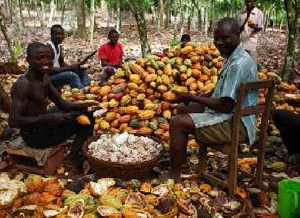 The report described the marketing costs of cocoa in Ghana as unduly high per international standard
The report described the marketing costs of cocoa in Ghana as unduly high per international standard
A World Bank report says the Ghana Cocoa Board (COCOBOD) has failed in stabilising farm gate prices at levels that permit farmers to earn an adequate return on their lands, labour and capital.
The report published this month and titled ‘Fiscal Consolidation to Accelerate Growth and Support Inclusive Development’, criticised successive governments for prioritising revenue generation and treating the final price received by farmers as a secondary consideration rather than the objective”.
COCOBOD is a government-controlled institution that fixes the buying price for cocoa in Ghana.
Ghana remains the world’s second-largest producer of the commodity.
The report recommended a renewed focus on price stability, saying it would help reduce the economic uncertainty faced by cocoa farmers, facilitate long-term planning and boost productivity.
The World Bank report was unhappy about COCOBOD’s dominant role in the supply chain of the cocoa subsector, describing it as “a source of uncertainty and inefficiency.
“Though often referred to as ‘free inputs’, the cost of the inputs supplied by COCOBOD reflected in the prices farmers receive for their produce; moreover input distribution is often erratic and is subject to corruption and capricious political interference,” the report revealed.
It was unhappy about the fact the while all farmers paid for cocoa inputs, only selected farmers received them, and in some cases “COCOBOD inputs have been illegally exported to neighbouring countries”.
COCOBOD is the principal supplier of fertilisers, pesticides, and seedlings to the cocoa subsector.
According to the report, COCOBOD’s pricing mechanism had succeeded in limiting competition in the Cocoa subsector.
It explained that the fixed price paid by licensed buying companies to farmers had effectively eliminated the possibility of price competition or product differentiation, adding “it has discouraged farmers from investing in quality beyond the minimum standard”.
The report described the marketing costs of cocoa in Ghana as unduly high per international standards, estimating that “total marketing costs are between 25 and 30% of the FOB price; this includes direct marketing costs of about 17 percentage points plus an estimated 8 to 10 percentage points to offset the COCOBOD’s costs”.
It further attributed the high marketing costs to poor road infrastructure, inefficient port handling and costs associated with quality control.